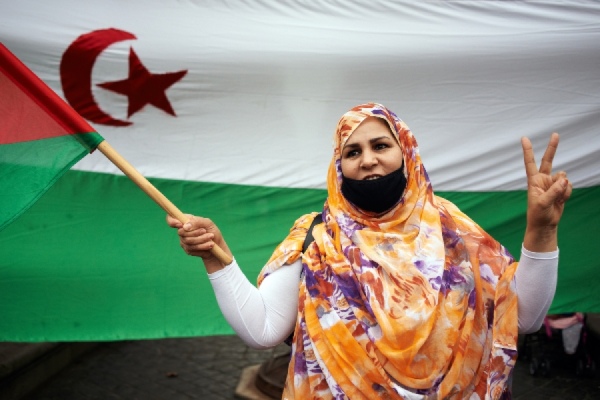The future of the disputed region lies in ruins following an intervention by Spain. By Christopher Clark.
On April 7, Spain’s prime minister, Pedro Sanchez, flew to the Moroccan capital of Rabat to meet with the country’s monarch, King Mohammed VI. The Spanish government said the two-day diplomatic visit marked the beginning of a ‘new stage’ of relations between the two countries, which have recently been beset by tensions centred on the disputed region of Western Sahara. In March, as part of a bid to ease these tensions, Sanchez had written a letter to the Moroccan king in which he effectively endorsed Morocco’s longstanding efforts to make Western Sahara its province. Sanchez said this represented ‘the most serious, realistic and credible’ means of resolving the decades-long dispute over the strip of resource-rich desert, which stretches along the Atlantic coast north of Mauritania and is often referred to as Africa’s ‘last colony’. The move suggests that Spain, Western Sahara’s former coloniser, is backing away from the 1991 UN proposal to let the Sahrawi, as the indigenous population of the territory are known, decide their own status through a referendum, which it had traditionally supported. A longstanding feud between Spain and Morocco over Western Sahara culminated last year with Morocco recalling its ambassador in protest. The incident was sparked by Madrid’s decision to allow Brahim Ghali, the leader of the territory’s independence-seeking movement, Polisario Front, to undergo Covid treatment in Spain. Morocco responded by loosening its border controls around Spain’s North African enclave of Ceuta, provoking the unauthorised crossing of thousands of migrants from Morocco and other African countries. Spain’s reversal on Western Sahara, which many commentators have linked to fears of further waves of migration, marks the latest in a series of diplomatic victories for Morocco as it looks to tighten its grip on the territory. This follows a similar announcement made by former US president Donald Trump in December 2020Trump in December 2020, in which he stated that his government had recognised Moroccan sovereignty over the entirety of Western Sahara in exchange for Morocco normalising ties with Israel. While the bulk of the territory has effectively been occupied by Morocco since Spain left in 1975, the south-eastern triangle is controlled by the Polisario Front, which is backed by Algeria and considered by the UN to be the legitimate representative of the Sahrawi people. According to Khadija Mohsen-Finan, a political scientist and specialist on the Maghreb and the Arab world, Spain’s new position is a ‘big gift’ for Morocco.
‘Firstly, on a symbolic level, Spain is the former coloniser. Secondly, it’s a country with which Morocco has a great proximity – geographic, economic and historic,’ she said.
‘Also, Spain was perhaps the European country with the most favourable public opinion towards the Sahwari.’
In contrast, Spain’s recent reversal, like Trump’s announcement before it, which the Biden administration has refused to reverse, marks a diplomatic defeat not only for Polisario, but for Algeria and its strategy to support the resistance movement. When Sanchez’s letter to King Mohammed VI was made public in March, Algeria recalled its ambassador in Madrid after calling the move an act of ‘historic treason’. For its part, Polisario publicly severed ties with Spain on April 10, two days after Sanchez returned from his visit to Rabat. In a statement, the movement wrote that it had decided to break all contact with the Spanish government over its ‘instrumentalisation of the Western Sahara question in shameful bargaining with the [Moroccan] occupier’. There have been long-simmering tensions between Morocco and Algeria over the latter’s pro-independence stance on Western Sahara and its support for Polisario. These boiled over in August last year when Algiers announced that it would cut diplomatic ties with its neighbour over its alleged ‘hostile actions’. Algiers’ tolerance threshold towards its neighbour appeared to have effectively been reached a month previously when Morocco’s ambassador to the UN expressed support for a secessionist group in Algeria’s restive Kabylia coastal region. The Algerian government considers the group a terrorist organisation. While some commentators suggested Algeria’s announcement was in fact primarily an attempt to distract domestic audiences from its myriad internal problems, Jalel Harchaoui, a North Africa political analyst, said this was ‘certainly not the only issue at play’.
‘Morocco has undoubtedly behaved aggressively and the situation vis-à-vis Western Sahara is a very real geopolitical crisis, it’s not just a distraction,’ he went on.
‘There is also a very real security threat, and that has increased since Spain’s announcement.’
On April 12, Algeria condemned what it called an ‘attack’ by Morocco ‘using sophisticated weapons of war’ against a convoy of Algerian trucks in the border area between Mauritania and Western Sahara, the second such an alleged incident since November last year.
‘It’s very regrettable that force seems to be trumping human rights in Western Sahara,’ said Mohsen-Finan.
‘However, you can’t help but notice that the Moroccans are achieving their goal. Their aggressive methods are working.’


